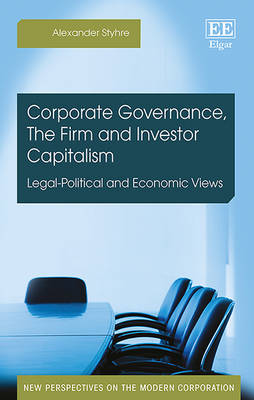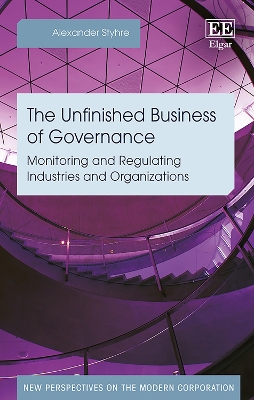New Perspectives on the Modern Corporation
4 total works
Corporate Governance, The Firm and Investor Capitalism
by Alexander Styhre
Covering the theory of the firm from the New Deal era until the post-2008 financial crisis, the book connects contemporary theories with their original legal roots, demonstrating inconsistencies in contemporary understanding. It also points at the differences between legal theory and neoclassical economic theory regarding the theory of the firm. The book examines how the entrenchment of shareholder welfare governance turns a blind eye to legal theory and corporate law, leading to theoretical inconsistencies and practical concerns, and criticises the agency theory argument in favour of unrestricted shareholder welfare governance. A comprehensive review of the literature on corporate governance, both in legal theory and in economics and management studies is included.
This enlightening and informative book is essential reading for corporate governance scholars, management studies researchers, legal theorists and business historians.
The book discusses the history and mechanisms of corporate law and the introduction of regulatory control to show how this has led to the development of a 'market for political influence' in the form of the lobbyism industry, think tank scholarship and advocacy, and donations to politicians and their parties.
Theoretical perspectives are complemented by empirical studies as chapters analyze a variety of practices, such as corporate social responsibility commitments, in the light of corporations' political objectives.
Management studies scholars and graduate students will benefit from the broadened perspective this book adds to organization theory and management studies literature. It will also prove an insightful read for policy makers and those working in regulatory agencies, as well as management consultants.
An in-depth overview of recent governance literature in management studies, economics, legal theory and economic sociology, exposes how governance theory affects securities markets, commodities trade, university ranking and credit scoring cases. The author examines how changes in competitive capitalism and the wider social organization of society are recursively both determined by, and actively shaping the underlying governance ideals and practices. Identifying the difficulties involved in balancing freedom and control in governance policy, he highlights the key concerns confronting governments, regulatory agencies and transnational agencies: how to ensure the efficient use of economic resources to avoid economic inequality without undermining the legitimacy of the current market-based economic model.
Essential reading for academics and graduates in management and the social sciences, as well as policy makers and management consultants, The Unfinished Business of Governance gives exceptional insight into the challenges facing governance within free markets.
Discussing the growth of oligopolistic market niches in the American economy, chapters explore their causes, including the influence of "anti-antitrust" scholars on legal enforcement practices and the resulting relaxation of antitrust law. The book highlights their consequences, including the growth of monopsony and labor market concentration. Alexander Styhre uses aggregate economic equality data across the book to show that the working class in advanced economies have not been compensated for the globalization of the economy. It concludes by looking towards the long-term consequences of rising economic concentration, examining non-traditional labor contracts, new employment relations, lower entrepreneurial activities and lower labor compensation in the new corporate landscape.
This informative book will be useful to students and scholars of business ethics and trust, corporate governance and organization studies. It will also be a critical read for policy makers concerned with the causes and consequences of economic inequality.



